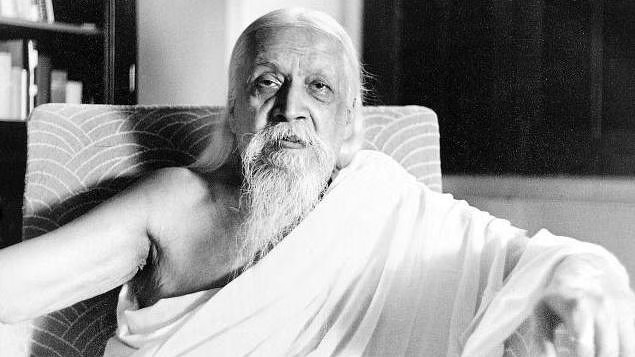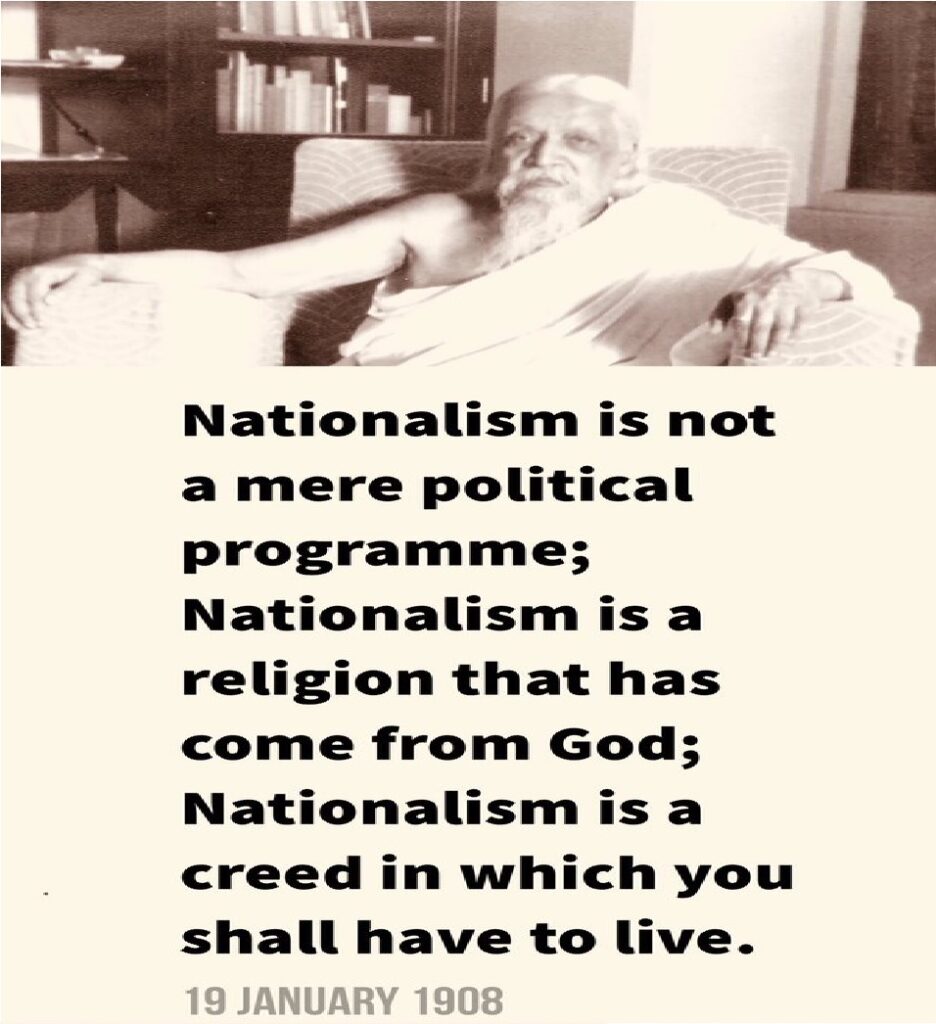
Sri Aurobindo, originally known as Aurobindo Ghose (1872 – 1950 ), is regarded as the prophet and father of Indian nationalism. From his early years he was an ardent nationalist. In his view, nationalism was not only a mission, a goal of life, but an end to the pursuit, as vigorously as a religion. With him, nationalism was not a mere political slogan nor a mere intellectual idea but his first passion and religion. In one of his speeches in 1908, Aurobindo announced:
Nationalism is not a mere political programme; Nationalism is a religion that has come from God; Nationalism is a creed which you shall have to live…. If you are going to be a nationalist, if you are going to assent to this religion of Nationalism, you must do it in the religious spirit. You must remember that you are the instruments of god.
Thus, Aurobindo not only awakened his countrymen to their sacred duty at that juncture, but also imparted a new moral tone to their national movement, ultimately preparing the mind of the country for the forthcoming social revolution. According to Dr Karan Singh “For him, (Sri Aurobindo), India was no mere geographical entity, no mere physical and material land mass, no mere intellectual concept, but a goddess incarnate, a mighty mother who for centuries has cradled and nourished her children and who at that time, was groaning under the yoke of a foreign oppressor – her pride shattered, her glory ground to dust” . Thus India as a nation was eulogized by Sri Aurobindo as the mother, but a mother in chains, and the primary duty of her sons was to win freedom for the Mother, to strive by every possible means to liberate her from her shackles.
Sri Aurobindo was convinced that imitation of Europe was not at all conducive to India’s regeneration. In his view, the test of the vitality of the nationalist movement was its non-importive, non-imitative and non-artificial character. He argued “For a nation which is not attempting to Imprint its personality on such a movement is moving towards self-sterilization and death.” He, therefore, exhorted the Indian people to uphold the Sanatana Dharma which was the essence of their national personality. Sanatana Dharma and Indian Nationalism were therefore co-terminus. In his own words “ I say no longer that nationalism is a creed, a religion, a faith; I say that it is the Sanatana Dharma which for us is nationalism. This Hindu nation was born with the Sanathana Dharma, with it, it moves and grows. When the Sanatana Dharma declines, then the nation declines and if the Sanatana Dharma were capable of perishing, with the Sanatana Dharma it would perish. The Sanatana Dharma…. That is nationalism”.
Sri Aurobindo was convinced that imitation of Europe was not at all conducive to India’s regeneration.
Aurobindo’s concept of nationalism opened wider horizons for the national movement. He felt the task before us was not mechanical but moral, not political but spiritual. The aim of the nationalist movement was not confined to an alteration of the form of government – from a colonial rule to self government – but it embraced a comprehensive programme of nation building. Politics was a part of this programme, but only a part: he said “we should devote ourselves not to politics alone, nor theology or philosophy or literature or science by themselves, but to all of these – our Dharma : it is a spiritual revolution that we foresee and the material is only its shadow and reflex”. The realization of the spirituality of India could alone make the nation free and great. The European ideal of ‘mechanical’ freedom, on the other hand, concentrated on the outer social and political perfection, which was only half perfection; that, too the lower half. The formula of European politics was therefore insufficient. Aurobindo, therefore insisted that India’s salvation does not lie in the enlargement of Legislative councils, introduction of elective principle, colonial self-government, or the like. His ideal of nationalism itself could not accommodate the Moderates objective of dominion status of India.

Aurobindo aimed at the seizure of political power as a prelude to India’s national regeneration. Once freedom from the foreign yoke was achieved, all other steps in the direction of national regeneration – moral uplift; the industrial and social development and educational reconstruction – would be undertaken successfully. In fact Aurobindo’s concept of Swaraj was something more than political freedom; he said “ Swaraj as a sort of European ideal, political liberty for the sake of political self-assertion, will not awaken India. Swaraj, as the fulfillment of the ancient Life of India under modern conditions, the return of ‘satyayuga’ of national greatness, the resumption by her ( Mother India) of her great role of teacher and guide, self-liberation of the people for the final fulfillment of the Vedantic ideal in politics, this is the true swaraj for India. She cannot do it without taking the management of her own life into her own hands. She must live her own life and not the life of a part or subordinate in a foreign empire”.
Aurobindo aimed at the seizure of political power as a prelude to India’s national regeneration.
Accordingly, Aurobindo envisaged two fold tasks for the realization of nationalism in India. (a) Winning Swaraj for India so as to clean her social and political life from the pollution of European origin; and (b) Return to ‘ our old national individuality’, so that India would play her great role in the redemption of the whole world. National regeneration of India was, for Aurobindo, not the final goal. It was a stepping stone to universal regeneration. The great roel that India was to play at this juncture was described by Aurobindo in a brilliant editorial of Bande Mataram, dated 28-03-1908, entitled ‘ Spirituality and Nationalism’: “ A great light is drawing on the East, a light whose first heralding glimpses are already seen on the horizon. The perfect expression of Hindu spirituality was the signal for the resurgence of the east. Mankind has been long experimenting with various kinds of thought, different principles of ethics, strange dreams of perfection to be gained by material means, impossible millenniums and humanitarian hopes. Nowhere has the society or politics helped it to escape from the necessity of sorrow, poverty, strife, dissatisfaction from which it strives an outlet; for whoever is trying to find one by material means, must inevitably fail. The East alone has some knowledge of the truth, the East alone can teach the West, and the East alone can save the mankind”.
Evolution of Human society according to Sri Aurobindo:
1) Stage of spontaneity: at this stage, the forms and activities of community formation, its traditions and customs and institutional setup are the result of natural organic growth. Natural instincts and environmental needs play an important part in its formation. Thus, in this stage of development, natural instincts and religious symbols go together.
2) Stage of Consciousness: In the stage of consciousness people become intellectually self conscious and start thinking about life and its problems, with the help of intelligence and creative power. This stage is predominantly psychological and ethical in nature. In this stage intellectuals get importance and come forward as the initiators of the age of reason and revolt or progress and freedom.
3) The triumph and failure of reason: In this stage, human beings in collectivity begin to live more deeply and purposefully. Life of human beings at this stage will be governed by a sense of unity, sympathy, spontaneous liberty and the spirit of individual and common existence.
Nature of human unity
Human unity wouldn’t be a mechanical unity of establishment, under the iron law of the state or any such kind of mechanical organization. There would be no suppression of Individual life or life of a smaller community. A universal conception of the full life of a smaller community will blossom. An universal conception of full development of potential and expression of multifaceted diversity would flourish. The future society will be a society of complex oneness, a world society in which the present nations will be intrinsic parts of the whole. The national societies would continue to function as cultural units, but their physical boundaries would have no relevance as they would look beyond them to realize the vision of the unity of mankind.
(The author has an MA in International Relations)
Viswapramod is a PhD Scholar at the Department of International Studies and Political Science, Christ University, Bangalore. He has an MA in International Relations. Views expressed are the author’s own.
